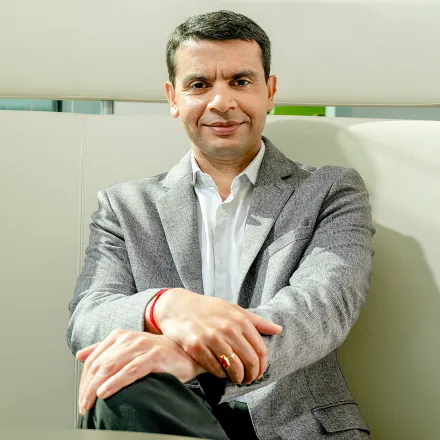Ready to build your own Founder-Led Growth engine? Book a Strategy Call

Frontlines.io | Where B2B Founders Talk GTM.
Strategic Communications Advisory For Visionary Founders
Actionable
Takeaways
React with appropriate urgency to existential technology shifts:
When ChatGPT launched, Des and the team immediately recognized it could eliminate their entire category. Within days, they "ripped up the roadmap" and went "hard on it." Four weeks later, they shipped their first AI features, and eight weeks later launched Fin, their AI agent. Des emphasizes this wasn't heroic—it was survival: "I don't know if I'm going to survive over here, but I'm not going to survive back there." B2B founders facing similar disruption should move with maximum speed rather than hoping for gradual adoption timelines.
Choose painful focus over comfortable sprawl:
Intercom's decision to abandon their marketing and sales tools to focus solely on customer service was existentially difficult but critically necessary. Des explains they were "trying to bring too much software to market" and facing the challenge that enterprise buyers couldn't figure out who to talk to about their horizontal platform. The focus decision came from identifying where they had "the clearest right to win"—customer service had their happiest, stickiest revenue and most differentiated product. B2B founders should ruthlessly evaluate where they have the strongest competitive position rather than trying to serve every adjacent market.
Align pricing models with value delivery in AI transitions:
Intercom moved from seat-based pricing to outcome-based pricing, charging roughly $1 per resolution. This required confidence that their AI actually works—Des notes "you should only charge for outcomes if you're definitely delivering outcomes." The pricing works because some customers find it "10x to 20x cheaper" than their current approach, while others struggle with the cost depending on their customer value. B2B founders implementing AI should consider how pricing models need to evolve to reflect the actual value delivered rather than traditional input-based metrics.
Embrace the innovator's dilemma decisively:
Des argues most B2B companies are responding to AI with "delay" or "dilution"—either waiting another quarter or making meaningless changes. He advocates for completely reimagining products "from a blank page, as if it's 2025 and AI is here." The book he's writing addresses this challenge: companies must choose between building the product that kills them or dying of natural causes. B2B founders shouldn't hedge—they should assume AI capabilities will advance rapidly and rebuild accordingly rather than making incremental adjustments.
Build authentic thought leadership around your expertise:
Intercom's marketing strategy centered on genuine knowledge sharing rather than typical B2B lead generation tactics. Des explains they wrote "everything that was true and stuff that we genuinely believed" about running B2B SaaS products, creating real value for their target market. Their current AI content follows the same approach—sharing practical insights about AI implementation rather than hype. B2B founders should focus on contributing genuinely valuable knowledge to their industry rather than optimizing for short-term lead capture.
Conversation
Highlights
How Intercom Rebuilt Itself for the AI Era: A Strategic Transformation Story
November 30, 2022 marked a pivotal moment for countless tech companies worldwide. For Des Traynor, Co-Founder of Intercom, it became the day that would fundamentally reshape his company’s entire trajectory. In this recent episode of Unicorn Builders, Des shared the remarkable story of how Intercom transformed from a sprawling horizontal communication platform into an AI-first customer service powerhouse—a transformation that required abandoning profitable product lines and rebuilding their entire business model in a matter of weeks.
The Five-Alarm Fire Moment
The morning ChatGPT launched, Des received what would become one of the most consequential Slack messages in Intercom’s history. “Got a slack message from our head of AI and he was like, you need to check this out,” Des recalls. What followed was a weekend of intensive analysis that led to a stark realization: their entire category was at existential risk.
“I was like, this thing can do customer support, it can chat, it can have good conversation, it remembers what you’re talking about,” Des explains. “This could basically do the job of tier one customer support, or at least a large enough chunk of it such that it’s going to put the existence of the category at risk.”
The response was immediate and decisive. “We ripped up the roadmap and kind of went hard on it. Four weeks later we had our first releases,” Des says. By his account, Intercom became “the first company to release like actual OpenAI GPT features in a SaaS product” just one month after ChatGPT’s debut.
The Technology Shift That Changes Everything
What made this AI breakthrough different from previous generations wasn’t just its capabilities—it was its accessibility. “Unlike all previous generations of AI and customer service, this thing worked really well out of the box and didn’t take a lot of training,” Des notes. This fundamental shift in AI usability meant that competitive advantages could emerge and disappear with unprecedented speed.
The internal demonstration process became crucial for building conviction across the team. “We would just give them like say we have like ChatGPT, like the old school ChatGPT. Consume a BBC news article and you’d ask it like 15 to 20 questions about that article,” Des describes their method for showing the technology’s potential. The results were compelling enough that “once people realized that it was just, you know, people can debate the timelines… but it is firmly not a case of if, it’s just a case of when.”
From Horizontal Sprawl to Laser Focus
Perhaps the most painful part of Intercom’s transformation wasn’t adopting new technology—it was abandoning existing success. After building a platform that served marketing, sales, and support teams across thousands of companies, Intercom made the difficult decision to focus exclusively on customer service.
“We are trying to bring too much software market,” Des reflects on their previous approach. The challenge of a horizontal platform became apparent as they tried to scale: “When you get into like say a 700 person or a 7,000 person business… they were like, well, who do you want to talk to? They had a marketing, they had a support, they had a sales. And I was like all of them? And they’re like yeah, I can’t do that bro.”
The strategic refocusing required identifying where they had “the clearest right to win.” Customer service emerged as that area—”where their revenue was the happiest, the stickiest, the kind of where our product was most differentiated.”
Reinventing Business Models for AI Outcomes
The shift to AI-powered customer service also demanded a complete rethinking of how to price and deliver value. Intercom moved from traditional seat-based pricing to outcome-based pricing, charging roughly one dollar per successful customer resolution.
“You should only charge for outcomes if you’re definitely delivering outcomes and we definitely deliver them,” Des emphasizes. This pricing model works because the value proposition is clear: “If Fin can do more than 70 resolutions in that month, we’re actually up. So, like, the cannibalization is a good thing.”
The results speak to the model’s effectiveness. Des reports that their AI agent achieves “about, I think 63% probably by the time you go to press 65 or something” total resolution rates, with some customers reaching over 80% automation.
The Depth Behind AI Implementation
One of Des’s strongest convictions is that building production-ready AI applications requires far more sophistication than many assume. He’s particularly critical of the “thin wrapper” narrative that suggests AI products are simply repackaging existing language models.
“People have said the same thing about, say, cursor or Windsurf. And I’m like, really? So you think that these guys have just made $2 billion for, like, basically repackaging ChatGPT,” Des challenges. “There’s 2 billion on the table if you really want it… sometimes the best education for people is to actually try and make the product themselves. And then that’s when they realize, ouch. This thing is actually really quite hard and quite complicated.”
This complexity extends to crucial elements like human handover protocols, answer quality assessment, and system reliability—areas where shortcuts become apparent quickly in customer-facing applications.
Marketing Through Authentic Expertise
Throughout Intercom’s evolution, one constant has been their approach to thought leadership and content marketing. Rather than following typical B2B playbook tactics, they’ve focused on sharing genuine insights from their experience building and scaling software products.
“We wrote everything that was true and stuff that we genuinely believed. Like it wasn’t like Content Marketing 101 where you just make bullshit and throw it live,” Des explains. “We were actually trying to actually genuinely contribute to the sort of the corpus of knowledge around running a B2B SaaS product.”
This authenticity extends to their current AI-focused content strategy, where they continue sharing practical insights rather than participating in hype cycles. “Can we fucking chill with the hype speak and say something practical?” Des recently tweeted, reflecting his frustration with surface-level AI discourse.
The Broader Imperative for B2B Companies
Des’s experience has led him to believe that most B2B companies are responding inadequately to the AI transformation. He’s currently writing a book addressing what he sees as widespread failure to react with appropriate depth and urgency.
“I think in general, a lot of like… tens of multibillion dollar B2B SaaS, companies, maybe hundreds, perhaps, are like, not reacting with the appropriate level of urgency,” Des observes. “But also depth of reaction in that I don’t think they’re properly going roadmap to roadmap, team to team, person to person, function to function, and actually reimagining the whole thing from a blank page, like, as if it’s 2025 and AI is here.”
The alternative frameworks he’s seen—what he calls “delay” and “dilution”—involve either postponing meaningful changes or making superficial adjustments that don’t address fundamental shifts in capability and competition.
Engineering Culture Transformation
Beyond product changes, Intercom is also transforming how they build software. Their CTO recently released a memo committing to doubling engineering productivity within eleven months using AI tools. “We’re going to double the productivity of our engineering work in the next 11 months,” Des explains, noting that achieving this requires significant changes to “engineering culture, setup architecture, our people, our processes.”
Lessons from Fifteen Years of Building
When asked what has enabled Intercom to survive and thrive for over a decade, Des points to their consistent focus on solving meaningful problems with quality solutions. “We have always pushed ourselves to find a real solution to a real problem that recurs, that really matters to a business,” he says.
Equally important has been building “a company that you want to work in and you want to, like, be a part of.” Des takes particular pride in seeing employees grow throughout their careers at Intercom: “People who join us as an intern who are now a senior principal engineer, like world class Engineer… that whole career was built at Intercom.”
The combination of meaningful work, quality execution, and genuine care for employee development has created what Patrick Collison once described as making sure “your company’s a great place for great people”—a principle Des believes has been central to their longevity.
As AI continues reshaping the software landscape, Intercom’s transformation offers a blueprint for how established companies can navigate platform shifts through decisive action, strategic focus, and unwavering commitment to solving real customer problems. Their story demonstrates that survival in the AI era may require companies to abandon comfortable success and rebuild themselves around new technological realities—a challenge that will test the adaptability and conviction of leaders across the B2B landscape.



































































































































